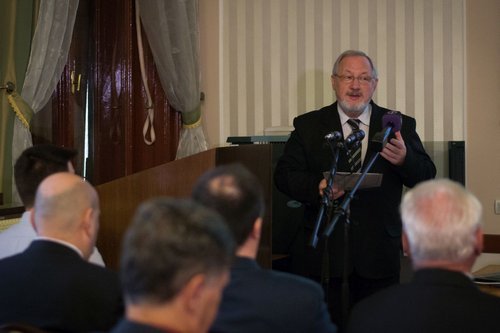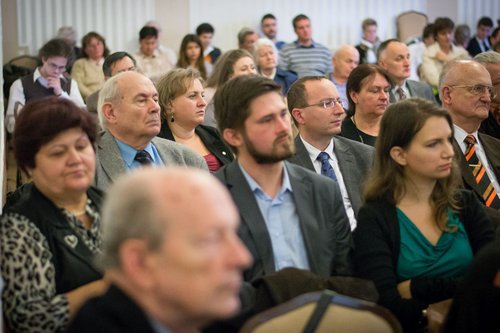On October 17, 2015, a conference organized by the Protestant Federation of Journalists (PRÚSZ) under the title "What was given by the Reformation to Europe or the World?" took place in the assembly hall of the Faculty of Arts of Károli Gáspár University of the Reformed Church of Hungary (KRE). The programme started with the the opening words of the Rector of the University Professor Péter Balla, and Zoltán Novotny, president of the PRÚSZ.
The opening presentation of the conference was held by Ministerial Commissioner Károly Hafenscher in the name of the Reformation Memorial Committee of Hungary, under the title of "Building of the future instead of nostalgy. 500 years ago - 500 years after”. In his presentation, this Hungarian Lutheran theologian underlined that it is very important for us, even in the 21st century, not only to know the teachings of the Reformers and the history of the church over the last 500 years,, but – at the same time – a life focusing on the Word of God must be lived.

National Supervisor of the Lutheran Church of Hungary, Deputy Secretary of State, Gergely Prőhle emphasized - referring to the observations of Max Weber (1864 - 1920), an outstanding German sociologist of the 20th century - that those countries were able to achieve siginificant economic development in Europe for centuries where people followed the views of the reformers that discontinued the medieval prohibitions relating to lending and interest picking.
György Fábri, the Superintendent of the Northern Diocese of the Lutheran Church, docent of the Loránd Eötvös University of Sciences of Budapest , analysed the communication methods and opportunities in the past five centuries of the Protestant churches in his presentation which evoked a lot of interest. He demonstrated the network connections of the Reformation and he underlined that the messages of the reformers were able to flow in a few weeks to every part of Europe with a speed which was very fast in those times - from the places of printing to towns of several thousand kilometers distance. This could take place not only in consequence of the development of printing technology but of the „Reformation sprit” as well.

The Superintendent of the Northern Diocese of the Lutheran Church drew the audience's attention to the conclusions of some studies carried out in the early 21st century indicating that nowadays messages sent by the Protestant Churches of this country addressed to the country as a whole, are able to reach broader masses of people with limited success only.
The main messages of the Protestantism were discussed by Joseph Steinbach, Bishop of the Danubian Reformed Church District in his presentation titled "Reformation and the Word of God”. He pointed out that everyday reading of the Holy Script which was introduced in the doctrine of the reformers, donated as a new kind of gratitude to Christianity. The first presentation in the second half of the conference was read by interior designer György Fekete , president of the Hungarian Academy of Arts, who analysed how the Hungarian Protestants are demanding or undemanding relating to arts.
Historian László Tőkéczki , Lay President of the Danubian Reformed Church District, General Superintendent focused on the issue of „the Reformation and a new public". The Protestants form the basis of the European public by including the corporate principle of bottom-up building which can be controlled and checked at all levels. He emphasized that this democratic structure rests on theological grounds.
The final presentation was held by Mrs. Enikő Sepsi, the Dean of the Faculty of Arts of the hosting institution. In her presentation, richly illustrated with slides, she dealt with the measures taken by the management of the Faculty of Arts helping students to achieve a modern, European-level knowledge. The students can broaden their knowledge about the spirit of the university during the "training weeks" which take place once in every 6th month. The following factors for the further professional development of the Faculty of Arts were mentioned by the Dean : at first, a wider cooperation with foreign educational institutions and providing scholarships , on the other hand, the expansion of doctoral schools, and at the third place, the launching of a vocational college, which will bear the name of the great Hungarian historian Kálmán Benda.
Between the presentations of the conference, poetic masterpieces connected with the Reformation written by the famous Hungarian poets Gyula Illyés and Sándor Reményik were proclamed by actor Csaba Lázár. A great success among the the participants of the conference was achieved with the musical contribution of two Kossuth Prize winner brothers, Dániel and Vilmos Gryllus (members of the Kaláka Group) - who made this event memorable by performing the hymn of the Reformation, beginning with the words „A Mighty Fortress Is Our God" , which is based on the words of Psalm 46.
Máté Millisits
Translated by Endre Millisits